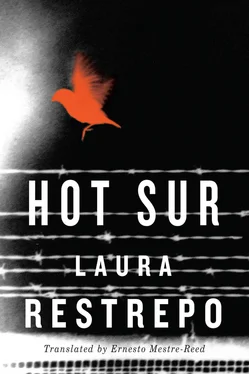He assures me that ever since the dogs noticed his sorrow, they live attentive to his every move, as if they are there to remind him that in spite of everything life is worth it. Almost every day at the house up in the Catskills, Rose takes them out for walks in the woods, single file until a squirrel or rabbit crosses their path or a field mouse flashes by, and the dogs go crazy. Rose likes to watch them out in the wild; they become doggedly doglike, their instincts liberated and their noses trained to the ground to follow the traces of whatever sexual effluvia or droppings they may find along the way. The excrement of other creatures is crucial for them, he tells me; from it they get more information about a subject than the CIA could with a whole legion of infiltrators. When their caravan regroups, it proceeds behind Skunko, the most ordinary and unkempt of the three, who has earned his spot as leader because of his infallible instinct to find the way back no matter how far off they’ve gone or lost they are. Even if it takes a few times going around in circles, Skunko’s instinct always manages to get them back home. Behind Skunko is invariably Otto, the oversized do-gooder that Rose inherited from his ex-wife, and at the rear, the bitch Dix, all four of them, Rose included, lifting their snouts in the air when they sense something burning or water nearby, urinating on the rocks or tree trunks. They superstitiously avoid the bend in the path where Eagles’s mutilated body was discovered, remain expectantly silent before the trail of a bear or a fox, mark with their own trail the bright, fresh snow blanketing the fields, distinguish the edible mushrooms from the poisonous ones, or lay down to rest on the moss in a clearing, warmed by the pale sunlight filtered through the leaves. That’s how it was that morning, Rose tells me as we have our tea and toast.
“Do you understand?” he asks me. “When Cleve died, I knew that all I had left were my dogs. My dogs and the woods.”
Sometimes his dogs crossed the line and got him in trouble, especially the beautiful Dix, a spirited and explosive female with jet-black hair, the daughter of a Labrador and a German shepherd, crazy by nature and out of control, like all mutts that are a cross between two noble lines. Old fights had left her covered in scars, and her main thing was breaking into chicken coops and contributing to the extinction of the mallard ducks and other semi-endangered species. On those occasions Rose rebuked her, but did not really mean it because deep down he was proud when she brought the prize in her mouth to him. Until one day Dix brought him Lili, the neighbor Mrs. Galeazzi’s cat. Lili was a soft puff of white cotton who never did anyone any harm, not even mice, and seeing her in such a shitty state, Rose hoped at first that it was just a pigeon or something, but he knew for sure it was Lili, Mrs. Galeazzi’s great love, when he noticed the collar. Poor, wide, loving Mrs. Galeazzi, another soft puff of white cotton who never did anyone any harm. Indeed, that tattered thing clenched in Dix’s mouth was Lili, and Dix placed it ceremoniously at Rose’s feet, looking up with sweet and pleading eyes seeking praise.
“Goddamn it, Dix!” he said, his eyes watering with rage and compassion. He was thinking how to punish her when Cleve intervened, because at that time he was still alive and accompanied them on their walks.
“Don’t punish her, Pa,” he said.
For Cleve, it was clear that there was something sacred and primitive in that act of the dog, in that ritualistic behavior inherited from her canine predecessors but nonetheless extremely human, this choosing of a victim, hunting her down and sacrificing her, but not eating her. According to him, the splendid aspect of the whole thing was the lack of a practical finality; it was something more complex, the confirmation of an order of things dependent on this gesture of bringing an offering to the master. What motivated Dix? Cleve didn’t know for sure. But Dix seemed sure that in this manner she sealed a pact with a superior being, in this case Rose, who in the eyes of others may have passed as a hydraulic engineer, but who in the eyes of the bitch was a sort of god.
“Shit, Cleve,” Rose said, “I know what the goddamned dog meant, but fuck, she could have brought me a rabbit or something.”
“She feels that the rarer the prize offered, the greater the honor rendered,” Cleve said.
“Fine, fine. Since you seem to be so in tune with the animal kingdom, can you tell Dix that her god only accepts rabbits? And figure a way out of this jam. If we bury Lili without saying anything, we’re going to have to watch poor desperate Galeazzi looking for her cat everywhere. And if we confess the truth, the neighborhood junta is going to insist we put Dix to sleep. They’re going to claim that the next victim will be a child, so your theories will be useless in defending her.”
Cleve calmed him down, convincing him there was a third way, and proceeded to pick up what was left of Lili, barely a few tufts of hair. Stealthily, he put the remains with the collar and everything on the road in front of Mrs. Galeazzi’s house and smashed it down with a rock that he tossed far away later, so she’d think Lili had been run over by a car.
“You should have seen Cleve that night, carrying out his sinister plot,” Rose tells me with a mournful smile. “The only thing he was missing was a mask. But I felt bad about the deception. I really felt like shit. Not Cleve. He was different about things. Look, I’m a simple person, someone who likes to observe and not much else; my son, on the other hand, had a lot of things seething inside. I don’t know anything about ceremonies and symbolism; suffice it to say that my most complicated ritual is this white cloud I put in my tea in honor of my mother. What can I say, that’s as deep as I get? Fortunately, Mrs. Galeazzi got another cat; she watches it night and day and doesn’t let it out of the house.”
Ian Rose is well aware that under certain circumstances his dogs can be horrendous, and not just Dix, but all three of them. Always playful and well trained, they become like fiends if they sense a threat or detect that someone has trespassed into their domain. It doesn’t happen often, but when it does, he tells me it’s astonishing to watch them, something admirable even, to see how they crouch and their fur stands on end, how their eyes grow brilliant and their looks askance, how their every joint becomes flexible and their whole anatomy molds itself to the ruthless agility of the hunt. They regress, turning into the wolves they once were in a matter of seconds and begin to behave like a pack, now in attack mode, so the hierarchy changes, with Dix leading the way, an Amazon; the great Otto behind her, a military tank; and Skunko, the little one, a killer expert at going for the jugular. More than once Rose has had to save some careless trespasser, or even some friend who is visiting and makes a sudden gesture or laughs too loud, from his canine guerrillas. Of course, all Rose has to do is pet them on their backs and say “That’s it, that’s it, everything’s fine, toy hounds,” for them to calm down and begin wagging their tails, becoming again as harmless as puppies, exonerating the victim they were just about to tear to pieces. “Let that be a warning,” Rose tells the intruder, or if it’s a friend, he tells him to take a deep breath, brings him a glass of water, and begs a thousand pardons for the fright.
On the morning after the manuscript arrived, Rose and the three dogs went out into the woods afterward, following Skunko as they always did when in search-and-discover mode, heading in no particular direction. They had been walking for more than two hours when they came across abandoned railroad tracks, half camouflaged by foliage, and they instinctively obeyed that sort of mandate that rails impose, to follow them from nowhere to nowhere else. They allowed themselves to be led, as if hypnotized by the ties slippery with moss, and Rose tried to think of nothing else but how the distance between railroad ties was half a stride.
Читать дальше












